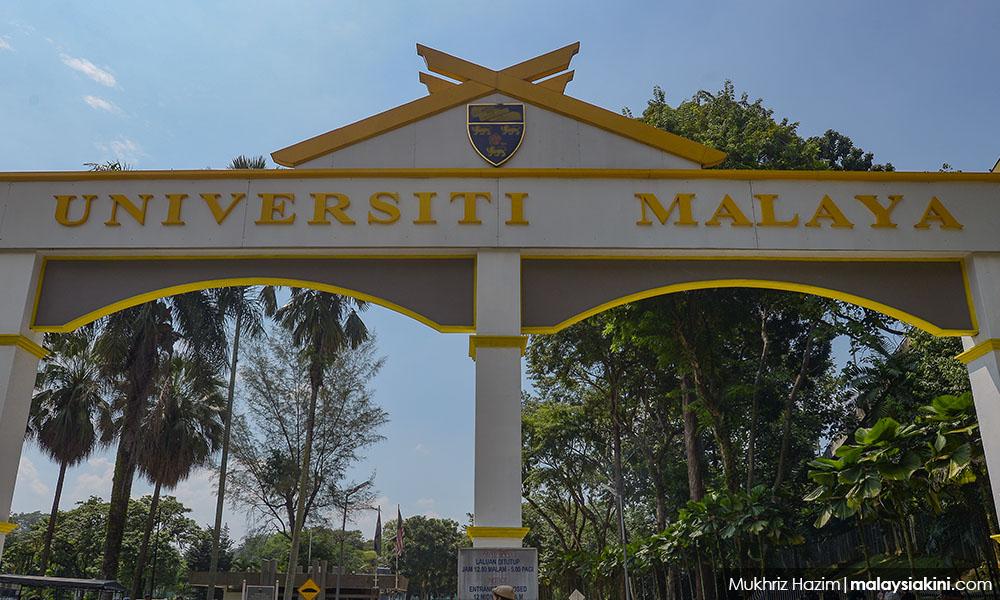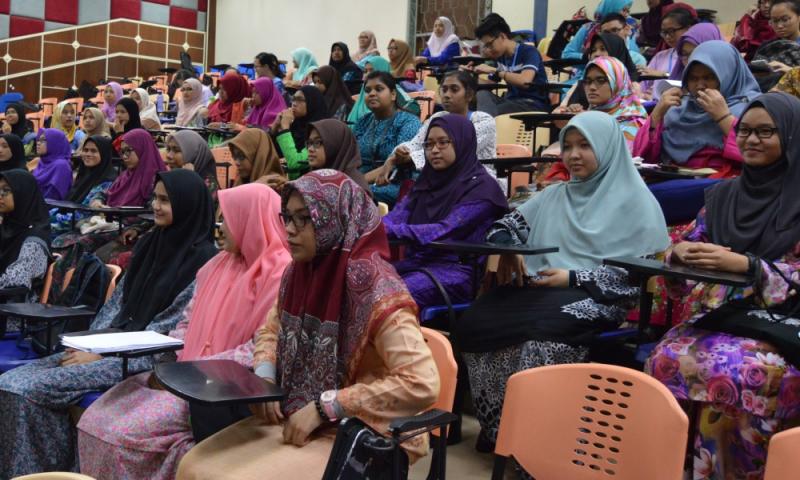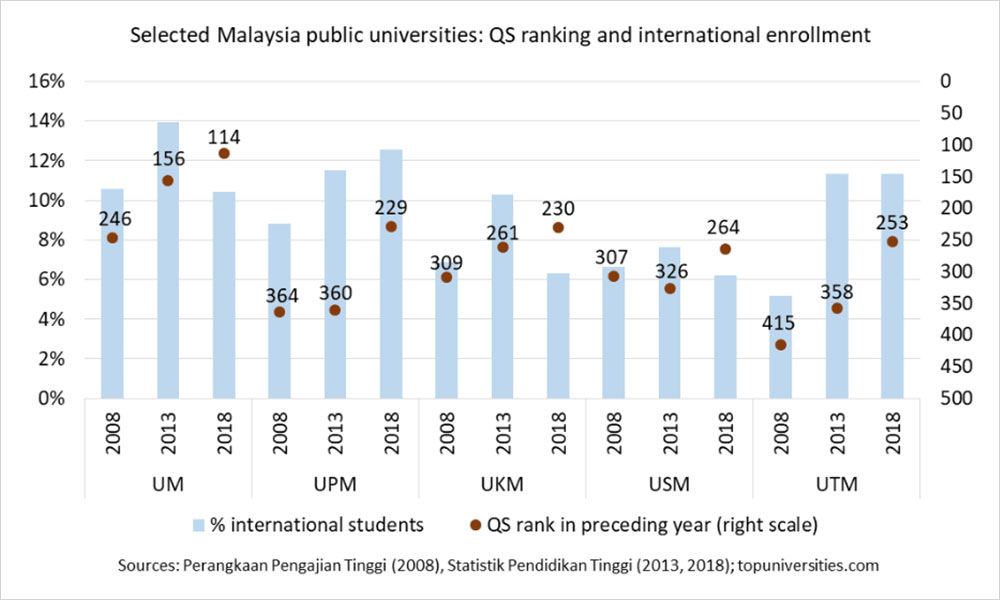COMMENT | Gerak notes with interest the December 13 statement by the Public Universities Vice-Chancellors and Rectors Committee (JKNC/R) taking issue with criticism of public universities’ obsession with international university rankings.
JKNC/R’s piece, while directed at Gerak, is clearly prompted by our member Lee Hwok Aun’s article.
We welcome the JKNC/R’s response, and the attempt to assure the Malaysian public that public universities are not obsessed with the rankings.
We wish we could be confident about these assurances. Unfortunately, the JKNC/R’s commentary leaves more questions than answers.
In particular, four issues are still hanging.
First, does this article represent a consensus among vice-chancellors and rectors? We also note the opinion of IIUM rector, professor Dzulkifli Abdul Razak (below), who wrote in his NST column that he is “increasingly unsure of the worth of the ranking game”, and that he is “of the opinion that the whole exercise is ‘intellectually dishonest’, perhaps bordering on unethical”.

Do other vice chancellors or rectors harbour such deep reservations?
Gerak is also concerned in this regard about the lack of disclosure on the pursuit of rankings more generally, including the question of funding.
Public universities operate using public funds. Any expenditure must be beneficial and bring positive returns to society at large. Do the benefits gained from the pursuit of ranking outweigh the amount of money spent on it?
Unfortunately, little information has been provided by all the public universities about the costs involved in pursuing the rankings game.
For instance, how much has been spent on hosting foreign faculty and students (for internationalisation marks)? How much has been spent on page charges (for publishing in paid publications, increasing number of papers and citation numbers)? How much money has been put aside by universities to house special units and personnel to satisfy the ranking pursuit? And so forth.
It would have been great if the JKNCR had shed some light on this as well.

Second, the JKNC/R speaks soothing words about the benefits and limits of rankings, but neglects to respond to the specific issues raised by Lee.
Everyone, even QS, will admit that the rankings have limitations and flaws. The JKNC/R article evades the specific issues highlighted in Lee’s article, instead choosing to dwell on generalities that are easily agreeable, but not meaningful for addressing the problems at hand.
They merely note, “while recognizing that university rankings are here to stay, we are aware of their many limitations, their intended and unintended biases, and their convenience-based usage by institutions and other parties. They cannot be the one and only measure of excellence.”
It is worth recapping Lee’s arguments, which should spur our university administrations to reconsider the dominant role of the rankings criteria.
The recent experience of Universiti Malaya, as Malaysia’s top ranked university that other public universities will likely model, is highly pertinent.
Is the word 'obsession' causing discomfort? Call it obsession, fixation, or preoccupation, but the underlying issue is the same. UM has kept using as the dominant yardstick, despite a host of problems and deficiencies.

UM’s soaring performance in the overall rankings masks backsliding on various fronts. All of UM’s flagship programmes, which breached the top 50 in subject rankings and were lavishly celebrated until 2017, have fallen down those lists since then.
UM’s score on the QS system has improved the most in citations – which has biased the universities’ resources and reward systems toward highly cited research – and in “reputation” as reported in voluntary surveys (not randomly sampled). On internationalization of staff and students, which are based more objectively on empirical data, UM’s score has continuously declined.
Whether UM is obsessed/preoccupied/fixated with the rankings is a question of attitude. To gain some insight, let’s consider the administration’s media statements, which reflect the issues and measures of success that it chooses to tell the world.
From 2017 to 2019, 11 out of 18 media statements celebrate UM’s rankings. None of the others concern academic achievement; six are administrative or non-academic in content.
Other universities do not publicize such all-consuming enthusiasm for their ranking scores, but you do not shout so loud when your rank is above 300 or 200. Will they become more consumed if they start to breach the top 200, then possibly the top 150 and 100? It feels like they will follow UM.
Third, the JKNC/R suggests the teaching and internationalization of universities as major priorities that are enhanced by participating in the rankings game, but overlooks how rankings either have little to do with the teaching dimension, or have a dubious record of delivering benefits.
JKNC/R says the “main purpose is to support students' pursuit of their academic goals”, but teaching factors in negligibly in the QS rankings. If JKNC/R truly holds this view, should they not decisively declare rankings as a secondary priority?
They go further in specifying some benefits of the rankings, notably that it enhances reputation and provides a reference for prospective students.
This is the biggest element of QS’ business. But is it delivering?

The JKNC/R statement did not specify Malaysian or international students; let us consider both in turn. For the JKNC/R to expect Malaysian university applicants to refer to the rankings is dumbing down the process. If it is true that applicants actually use the rankings as a primary reference, this is a major indictment of our education system which needs to be redressed.
Malaysia has only 20 public universities, and many universities specialize in particular programmes. It is hard to imagine the international rankings adding anything meaningful to the applications process.
UM, UPM, UKM, USM and UTM attract the cream of the crop because they are more established and prestigious, and information and alumni testament are abundantly available to make informed choices.
In addition, what sort of students do we desire? If they really do rely on the rankings rather than their own in-depth research to find a good programme that matches their interests and abilities, this should actually cause alarm because the system is stifling their brains.
We should instead invest in educating and counselling them on how to research and select their choice programmes, perusing university websites and lecturer profiles, and so on.
Let’s look at international students. Rising up the rankings generates publicity and can enhance universities’ brand. But the recent track record is woefully lacklustre.
The chart below shows international students share of enrolment and the QS ranking of five established universities of the preceding year, which would be referenced by prospective applicants.
Between 2013 and 2018, UM, UKM and USM steadily improved their rankings, and internationalization fell. UPM and UTM steeply climbed the QS ladder, but international student shares only inched up marginally.
The JKNC/R, in extolling the internationalization benefits of rankings, presumably includes research collaboration in the mix. This is even more serious than the issue of students referring to rankings in their decision-making.
Any experienced scholar will know that expertise and academic records, personal ties and networking, are the decisive bases for international collaboration and productive endeavours. Institutional rankings, if factoring in at all, are an afterthought.
We hope our university administrations focus on academic staff empowerment rather than relying on the rankings to boost internationalization of research.
The fourth and final problem with the JKNC/R statement is simple and fundamental. We read the closing paragraph, which reveals that this committee of university leaders is waiting for the Ministry of Education to decide whether the rankings matter.
The reluctance of vice chancellors to exercise their intellectual faculties and professional autonomy, and to declare their own stance, is astonishing.
The JKNC/R justifies the policy of prioritizing rankings without critically addressing the limitations and flaws, and ultimately deems the practice and the current KPI template will continue because MOE says so.
Indeed, many systemic and deep-seated problems persist, but all the more Gerak calls for vice chancellors and rectors to rise up to the leadership and rigour expected of their rank.
GERAK is an academic group.
The views expressed here are those of the author/contributor and do not necessarily represent the views of Malaysiakini.





